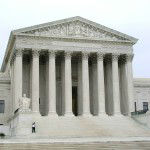Supreme Court Kicks Off Historic Agenda: Part III

The U.S. Supreme Court currently has 48 cases on its docket for the October 2012 Term. However, it is very likely that the term’s blockbuster cases have not yet been added to the docket. Voting rights and same-sex marriage are two clear examples.
At its October 26 Conference, the Court will consider several additional petitions for writ of certiorari. The legal term refers to the legal document filed with the Supreme Court seeking review of a decision of a lower court. When the Court agrees to hear a case, it grants a writ of certiorari.
Although most petitions are ultimately denied, the Court will likely grant review of several additional cases. Below are several petitions to watch:
Delling v. Idaho: The Court has been asked to consider whether the Fourteenth or Eighth Amendment mandates the availability of an insanity defense in criminal cases. The Court reserved the question in Clark v. Arizona, 548 U.S. 735, 752 n.20 (2006).
Nix v. Holder and Shelby County v. Holder: Both cases challenge Section 5 of the Voting Rights Act of 1965, which requires several states to obtain preclearance from the Department of Justice before making changes to their voting procedures. The specific question presented is whether Congress’ decision in 2006 to reauthorize the provision exceeded its authority under the Fifteenth Amendment and thus violated the Tenth Amendment and Article IV of the United States Constitution.
Mount Holly v. Mt. Holly Gardens Citizens in Action, Inc.: The Court will be asked weigh in on whether disparate impact claims can be filed under the Fair Housing Act. If so, the question becomes how to determine whether a prima facie case of disparate impact has been made.
With respect to same-sex marriage, there are currently eight petitions pending with the Court. Seven of the cases involve the federal Defense of Marriage Act (DOMA), while the other challenges the constitutionality of California’s “Proposition 8,” which seeks to ban same-sex marriage in that state. The Supreme Court has not yet announced when it will consider the petitions, but they could be addressed in the November conferences.
Previous Articles
Justices Skeptical of Trump Administration Tariffs
by DONALD SCARINCI on December 18, 2025
The U.S. Supreme Court heard oral arguments in Learning Resources, Inc. v. Trump (consolidated with...
SCOTUS Takes Up Key Election Case Involving Mail-In Ballots
by DONALD SCARINCI on December 17, 2025
The U.S. Supreme Court recently granted certiorari in a key election case, Watson v. Republican Nat...
SCOTUS Adds Second Amendment Case to Docket
by DONALD SCARINCI on November 27, 2025
The U.S. Supreme Court will consider another important Second Amendment case this term. The latest ...
The Amendments
-
Amendment1
- Establishment ClauseFree Exercise Clause
- Freedom of Speech
- Freedoms of Press
- Freedom of Assembly, and Petitition
-
Amendment2
- The Right to Bear Arms
-
Amendment4
- Unreasonable Searches and Seizures
-
Amendment5
- Due Process
- Eminent Domain
- Rights of Criminal Defendants
Preamble to the Bill of Rights
Congress of the United States begun and held at the City of New-York, on Wednesday the fourth of March, one thousand seven hundred and eighty nine.
THE Conventions of a number of the States, having at the time of their adopting the Constitution, expressed a desire, in order to prevent misconstruction or abuse of its powers, that further declaratory and restrictive clauses should be added: And as extending the ground of public confidence in the Government, will best ensure the beneficent ends of its institution.





